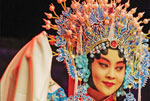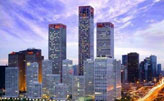Business
German giant moves from black to green
Updated: 2011-05-19 11:02
By Wang Chao (China Daily)
BEIJING - Having been the dominant supplier of government cars in China for decades, Audi is now endeavoring to turn these cars from black to green. Its predominant mission this year is to develop electric versions of its popular models.
In the 1990s when domestic brands were still in their infancy, there were very few high-quality Chinese cars for the government to choose from. The elegantly designed Audi, which was also the earliest domestically made high-end car, excelled to be the government's choice brand and still retains the title.
Although Zhang Xiaojun, executive vice-president of the sales division at FAW-Volkswagen Audi, said the government's fleet is only a small segment of Audi sales - "10 percent" - he cannot deny the huge effect the government's decision has had on Audi's private car sales numbers.
Stefano Nessi, manager of Electro-Mobility of Audi, admitted government officials "are very important to us".
"Actually, not only the government officials, the company executives in China are also our major clients. They love driving those extended versions," Nessi said. "For this reason, Audi produces A6 in the extended version only in China, with our joint venture partner FAW. It is not available in other parts of the world."
Recently, the company introduced a climate-controlled cup-holder in its Q5 crossover vehicle, designed for government officials and executives who tend to carry cups of tea in the car.
But these efforts seem small when compared to the brand's dedication to electric car development in China.
During the Shanghai auto show last month, Audi brought several stars - Q5 hybrid Quattro, A3 e-tron electric car, Q3 and the new generation A6. This is the first official introduction of the Q3 and e-tron worldwide. The Q5 hybrid is scheduled to enter the Chinese market in 2012.
"I wouldn't be surprised if the Chinese government takes the initiative to drive hybrid or electric cars," said Nessi. "Since China is facing oil shortage problems, and it needs to fulfill its carbon emission control missions.
"It is logical that the government takes the lead in encouraging electric cars, and we are prepared for that. That's why, starting next year, we will introduce electric vehicles step by step in China," Nessi said.
He said once the government buys more electric vehicles, it will be the standard for consumers as well.
The increasing pressure from its competitors, BMW and Mercedes-Benz, further solidified Audi's decision to speed up hybrid and electric car development in China.
Although Audi occupied the top position in conventional car sales in China in 2010, it recognizes its two major competitors are catching up.
In 2005, Audi sold 58,900 vehicles, followed by BMW with 23,600, then Mercedes-Benz with 11,500. In five years, BMW's sales numbers jumped sixfold to 158,000, and Benz by almost 12 times to 144,000. At the same time, Audi sold 225,000 cars, with 33 percent of the market share, down from 40 percent five years ago.
With the advent of the electric car era, Audi wants to take the lead in the world's biggest auto market.
Its competitors are not idling along. BMW already launched its electric car, Active E, which is expected to be tested in 2012 in China; and Mercedes-Benz started a joint venture company with BYD, the leading battery and electric car company in China, to develop electric cars in China.
"I believe the competitors are surely doing the same," Nessi said, "Of course, Audi doesn't want to lose the advantage in the government car field. If we don't speed up, we will be phased out in the new round of competition."
China Daily
(China Daily 05/19/2011 page15)
Specials

The song dynasty
There are MORE THAN 300 types of Chinese operas but two POPULAR varieties are major standouts

Sino-US Dialogue
China and the US hold the third round of the Strategic and Economic Dialogue from May 9-10 in Washington.

Building communities
American architect John Portman and his company have developed more than 30 projects across China.